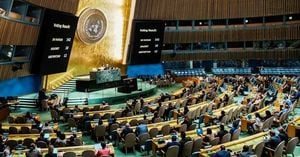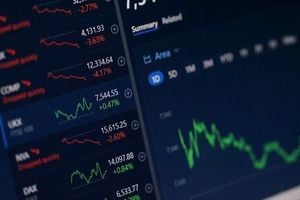The U.S. Commerce Department is probing Chinese AI firm DeepSeek amid allegations of using American chips restricted for export to China, raising significant concerns about data privacy and international trade compliance. This scrutiny coincides with Italy's Data Protection Agency (GPDP) opening its own investigation, reflecting wider unease over how DeepSeek handles personal data and the legality of its technology.
DeepSeek gained prominence earlier this year with the launch of its free AI assistant, which reportedly uses less data and operates at lower costs compared to U.S. models. Within days of its release, the application skyrocketed to the top of the Apple App Store, causing alarm among U.S. tech stock markets, resulting in nearly $1 trillion wiped off their value. A source familiar with the inquiry disclosed the Commerce Department's investigation, announcing, "The investigation is primarily focused on whether DeepSeek has violated export laws pertaining to semiconductor technologies."
The case is compounded by concerns surrounding organized smuggling operations of AI chips from multiple countries, including Malaysia, Singapore, and the UAE. These bumps on the global tech road have highlighted the intersection of data privacy with international trade laws, and how companies like DeepSeek might operate outside usual boundaries.
Nvidia, the supplier of advanced AI chips, stated they expect full compliance with U.S. export controls from their partners. "Many of our customers operate business entities based out of Singapore," Nvidia explained, asserting, "We will act accordingly if any violations come to our attention." Yet, Singapore's trade ministry asserted there was no evidence to suggest DeepSeek acquired restricted products via its territory, reinforcing its commitment to upholding legal standards.
Responding to inquiries, DeepSeek claimed it legally obtained Nvidia's H800 chips this past year. Still, uncertainty remains whether the firm has utilized other, more restricted chip models. Reports suggest the presence of less advanced H20 chips, prompting Marvelous Technologies CEO Dario Amodei to declare, "A substantial fraction of DeepSeek's AI chip fleet consists of chips ... and some very likely to have been smuggled."
The crossfire of legitimacy questioning continues as Italy's GPDP responds to DeepSeek's use of personal data, demanding clarification about where and how such data is collected. "The restriction measure ... deemed completely insufficient," GPDP stated, signifying their serious approach to user data privacy. The investigation signals Italy's commitment to data protection, echoing actions taken against major firms, including OpenAI just months prior.
Highlighting the sense of urgency around data handling, the Italian watchdog had previously blocked OpenAI’s ChatGPT, leading to substantial scrutiny. "The authority raised questions about DeepSeek’s training data, and whether personal data was scraped from the internet," they pointedly noted, showcasing the kind of detailed inquiry that's expected as both authorities pursue their investigations.
DeepSeek's rapid rise and the ensuing investigations expose fissures between U.S. tech interests and foreign competitors, compelling attention to security compliance rather than profitability alone. Limited options remain available as the U.S. seeks to maintain its lead against rapidly growing markets such as China.
With international businesses under the microscope, the scalability and growth of AI technologies lie precariously balanced on regulatory decisions and perceptions of compliance. The question remains: How will DeepSeek respond to these allegations and will it alter its approach to market penetration? While DeepSeek asserts its legitimacy, the forthcoming assessments from U.S. and Italian authorities will be pivotal as the AI arms race intensifies.
Looking forward, experts will closely monitor how the situation evolves, as consequences may redefine operational boundaries for many tech companies aiming to expand their markets without flouting regulatory laws. Only time will reveal how this investigation shapes the future of AI and international collaboration.



